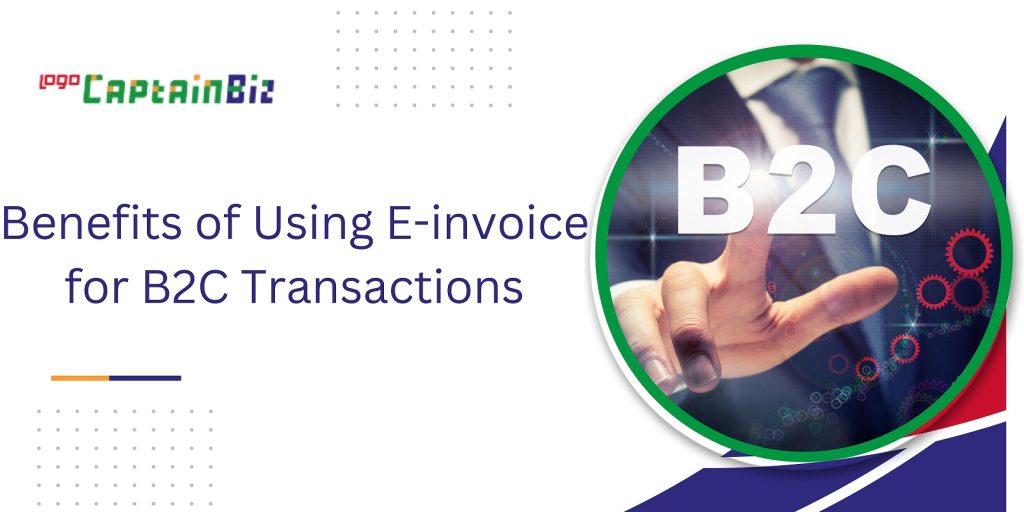E-invoices are changing how B2C transactions are conducted in the fast-paced digital world of today. Businesses and consumers alike are embracing this revolutionary innovation due to its capacity to improve operational efficiency and streamline regulatory compliance. As per the IMARC report, in 2028, the global E-invoicing industry was estimated to be worth US$ 35.9 billion (Source: imarcgroup.com).
E-invoice for B2C transactions can help companies maintain organised and easily accessible records of their transactions. This can be valuable for accounting, auditing, and dispute resolution.
What is a B2C E-invoice?
Business-to-consumer, or B2C, the electronic invoicing procedure between a company and specific customers is called “E-invoicing.” Companies offer customers a digital record of their transactions, encourage ease, and use less paper by sending electronic invoices to clients for purchases.
What is the Importance of E-invoicing?
The E-invoice for B2C transactions streamlines the invoicing process by enabling seamless communication between government departments and vendors.
How are E-invoices processed?
To submit an electronic invoice to a customer, you must translate (or convert) the information on your invoice into a format compatible with their ERP system. There are some variations in the formats that the various systems favour. Ask your consumer if you need clarification on the format to employ.
Information from your electronic invoices is automatically entered into your customer’s ERP system when they get them from you. By doing this, the possibility of error is significantly decreased, which is a significant issue when data entry into a system is done by hand. You can be more confident that the payment will be made correctly and on schedule.
What are the Benefits of Using E-invoice for B2C Transactions?

The convenience and improved efficiency it offers are two of its main benefits. E-invoices save time and effort for both customers and businesses by doing away with the need for physical documentation. Invoices may be created, emailed, and received electronically with a few clicks, streamlining the transaction process.
Streamlined Processes
The automation and standardisation of electronic invoicing decreases manual data entry and the requirement for paper-based documentation. This dramatically streamlines processes by simplifying the billing process from development to delivery.
Businesses can easily create, send, and receive invoices using E-invoices, which helps them save a lot of time and money.
Cost Savings
Everything about the laborious paper-based billing process—from printing to mailing—is avoided. Employees in charge of billing can now be allocated to different tasks. The corporation no longer has to invest resources in labour-intensive support functions like accounting and can focus on its primary business.
The invoice data can be automatically forwarded to the ERP/accounting system, relieving the recipient of the need to process the received invoice manually. Automated invoice processing would reduce the payment cycle and cost by 81% (Source: onlineinvoices.com) for any company.
Improved Data Insights
E-invoicing platforms offer applicable reporting and data analytics features. Companies can learn more about billing trends, customer payment habits, and other financial data. These observations can assist in streamlining financial procedures and guide strategic decisions.
Error Reduction
Inaccuracies in manual data entry can cause conflicts and delays in payments. Through automation and validation tests, E-invoicing solutions assist businesses in eliminating these errors by guaranteeing accuracy in invoicing. By doing this, the chance of expensive back-and-forth correspondence and delayed payments is reduced.
Remote Work
The employees of the organisation create the invoices online. Because of this, owners can access and utilise them whenever they choose, overcoming restrictions related to time zones, geography, and devices to provide seamless remote working for enterprises. As previously stated, once generated, these cannot be changed, guaranteeing accurate accounting.
Small firms that use electronic invoicing have effectively decreased their time on the mundane administrative procedures involved in manual accounting. By automating the accounting process, electronic invoices save time and workforce while ensuring efficient operations.
Security
E-invoices offer an additional degree of protection by reducing the possibility of fraud or interception. They can be distributed via distribution channels and are encrypted.
E-invoice archiving contributes to the security procedure as well.
The days of unsafe workstations, filing cabinets, and invoices saved on company servers are long gone. With the added security of electronic invoicing, businesses can rest easier.
Business and International Opportunities
International companies are made more accessible by using an E-invoice service. Business papers can be converted by electronic invoicing software into any format that the client requests. As a result, doing business internationally is made more accessible because neither the supplier nor the customer must perform any additional work.
Moreover, top E-invoicing services have access to global networks like CapitalBiz. This makes it easier and more secure for firms to submit cross-border invoices, enabling them to conduct business globally.
The E-Invoicing Advantage: Streamlining Your Business Transactions
How to Enhance Efficiency and Simplify Compliance with E-invoice for B2C transactions?
Simplifying the process and ensuring that companies follow legal and regulatory standards are usually the first steps in making compliance with E-invoices for business-to-consumer (B2C) transactions easier. To make E-invoice B2C compliance for transactions more straightforward, follow these steps:
- Clear Documentation: Make sure all pertinent data is precisely and unambiguously documented, including transactional and customer information.
- Selecting the Ideal E-invoicing Software: E-invoicing solutions come in various forms, from straightforward invoicing programs to more sophisticated ones that work with your enterprise resource planning (ERP) system. Select a solution based on what your needs and business require.
- Stay Informed: Since laws about E-invoice for B2C transactions might change over time, be sure to stay current on both local and federal rules.
- Use Standard Formats: Several formats are available for invoices, each with a distinct function in the company. The format that an organisation chooses should be based on its particular needs as well as the laws that are applicable in its country or area.
- E-invoices have organised data, may be automated, and are typically machine-readable. Invoices that are digital or electronic have distinct use cases and format kinds.
- Supplier Collaboration: It’s essential to consider how far your supplier’s network reaches. Choosing a supplier with a vast network of connected companies will assist in guaranteeing that your company can easily exchange electronic invoices with a wide range of customers and suppliers.
- Easy Payment Options: Provide consumers with streamlined payment alternatives via the electronic invoice to facilitate the electronic settlement of their invoices.
- Comply with Legal Requirements: To prevent fines and legal problems, be sure your solution and supplier can assist you in adhering to the constantly evolving E-invoicing regulations.
- Customer Support: Getting the support of your business partners, including suppliers and customers, is crucial if you want to benefit from E-invoicing. Ensure the vendor you choose can assist you with supplier onboarding, convince your business partners of the benefits, and set up your E-invoicing project for success.
How can E-invoicing Solutions simplify B2C Compliance?
Compliance with data privacy regulations is essential to protect individuals’ personal information and avoid legal repercussions. Here is how E-invoicing Solutions simplify B2C Compliance:
- Digital Signatures and Authentication: To guarantee the integrity and authenticity of invoices, several E-invoicing systems incorporate support for digital signatures and authentication techniques. Adherence to electronic invoicing standards and rules is crucial.
- Tax Reporting and Calculation: Based on transaction data, E-invoicing systems can automatically compute taxes, guaranteeing that the appropriate taxes are applied. To facilitate tax compliance, they can also produce tax reports.
- Tax Compliance is essential for E-invoicing. For tax compliance, certain nations could demand that the invoice contain particular forms or data items. Ensure all relevant tax information, including tax rates, VAT or GST numbers, and other applicable tax details, is included in your electronic invoices.
- Reduces Security Risks: E-invoices for B2C transactions are intended to be safer than their paper counterparts. Typically, private networks or protocols like AS2, FTPS, web services, VANs, etc., are used to send them. Data is safeguarded against document loss and invasions by third parties, and emails are encrypted to guarantee a secure interaction. Furthermore, electronic payments and payment records make money traces easier to track.
Conclusion
Electronic invoicing is a calculated step towards greater efficacy, efficiency, and transparency in the digital era, in addition to modernising traditional invoicing procedures. Businesses should work together to embrace the digital revolution and adjust to the changing environment.
By doing this, we may establish a business environment that is more beneficial for those involved while also being transparent, successful, and long-lasting. Get started today to enhance efficiency and simplify compliance with CaptainBiz.
FAQs
-
How does E-invoicing benefit companies?
By doing away with the need for manual invoice exchanges with clients, E-invoicing enhances cash flow. As a result, businesses that adopt electronic invoicing save time, make fewer mistakes and manage their cash flow more effectively.
-
What is B2C invoicing?
When a business bills a single customer for goods or services, this is known as business-to-consumer (B2C) invoicing.
-
What distinguishes E-invoicing from conventional invoicing?
In contrast to electronic invoicing, which generates, sends, and receives bills automatically and digitally, traditional invoicing relies on manual or paper-based procedures.
-
Why is E-invoicing advantageous in B2C transactions?
E-invoicing Benefits include better customer service, less paperwork, less administrative expenses, quicker payment processing, and enhanced data accuracy. Another tool for preventing tax fraud is E-invoicing.
-
When is a suitable time to start using electronic invoices?
As soon as you have selected an E-invoicing provider such as CaptainBiz that can meet your continuous E-invoicing needs, it is advised that you put it into practice.
-
How can E-invoicing help companies save money and time?
E-invoicing streamlines the invoicing process, reducing manual tasks and errors, which saves businesses time and money.
-
What are the essential components of E-invoicing software?
You can boost the efficiency of your finance department and increase the return on investment of E-invoicing implementation by implementing fast deployment and flawless user experience, invoice tracking, seamless integration with other systems, customization, reporting and analytics, supplier onboarding processes, and other valuable tools.
-
Can E-invoicing be integrated with other software systems?
Yes, you can integrate E-invoicing with different software programs. E-invoicing ability to interact with other software programs to automate and expedite the invoicing process is one of its main benefits.
-
Can E-invoicing solutions integrate with my existing ERP or finance systems?
Yes, E-invoicing solutions can integrate with your existing ERP or finance systems for streamlined invoice processing.
-
How does E-invoicing aid in compliance for firms?
With incorporated controls and the use of digital signatures to confirm the authenticity and integrity of the invoice, E-invoicing can assist firms in adhering to legal and tax rules, ensuring the integrity of the invoicing process, and preventing fraud.

